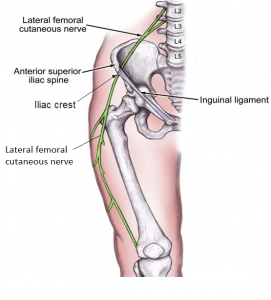How Biotherapy Alternative Medicine Clinic can help people with numbness, burning and pain in the thigh, Meralgia paresthetica or Bernhardt-Roth syndrome
If you suffer from numbness, burning, tingling and severe pain in the thigh, there is a big chance you have a disorder that is often misdiagnosed. The medical term for this disorder is Meralgia Paresthetica. The original term “meralgia paresthetica,” is derived from Latin. In translation, it means “pain and numbness of the thigh”. It also called Bernhardt-Roth syndrome named after medical doctors, who described the disorder in 1895.
Despite hundred of years of existence, treatment of meralgia paresthetica remains extremely difficult.
Practitioners in Biotherapy Alternative Medicine Clinic have a lot of experience to heal this condition naturally, without drugs.
It is known the culprit of the meralgia paresthetica is compression of the one of the big sensory
nerves; lateral femoral cutaneous nerve (LFCN); sensitive outer nerve of thigh. This compression results in a terrible burning sensation and pain, lack of feeling sensations in the outer thigh. Banding of the lateral femoral cutaneous nerve occurs in the iliac crest area because in this area nerve is closed only to the inguinal ligament and the muscle layer. Putting pressure on the inguinal ligament by wearing belts or tight jeans may cause meralgia paresthetica. Pressure on the lateral femoral cutaneous nerve can occur in the L2-L3 vertebras, in the pelvic area or in the area of the inguinal ligament (see picture).
Pressure on the LFCN, which supplies sensation to upper thigh, may cause symptoms of meralgia paresthetica:
- Numbness and tingling in the outer (lateral) part of thigh

- Burning pain or bee-sting like pains in the outer part of the thigh
- Less commonly, dull pain occurs in the groin area or across buttocks
- Hyper sensitivity to heat
Common reasons for meralgia paresthetica can include:
- Repetitive motion of the legs
- Topical injuries to the hip
- Abdominal compression when wearing trusses, belts, corsets, jeans, and wallets
- Scar tissue close to the inguinal ligament, due to injuries or past surgery
- Cycling, prolonged walking or standing
- Wearing tight clothing
The following conditions may raise the possibility of meralgia paresthetica:
- Overweight. Being overweight or obese may increase the pressure on the lateral femoral cutaneous nerve
- Sedentary life style
- Pregnancy. A large abdomen puts additional strain on the groin, through which the LFCN passes below the inguinal ligament
- Diabetes. Diabetes-related nerve injury (diabetic neuropathy) can lead to meralgia paresthetica
- Endometriosis in women and chronic prostatitis in men
- Age. People between the ages of 40 and 60 are at a higher risk
- Infectious conditions – it can be associated with herpes zoster, abscesses, appendicitis
Typically, pain in meralgia paresthetica encompasses the front outer thigh from just below the hip
to above the knee as you can see in the picture below. In many situations, this disorder is misdiagnosed and is treated regularly by painkillers. If conventional medicine therapy did not work or if it causes side effects, our non-drug approach can be extremely beneficial for you.
Meralgia paresthetica can be treated with alternative therapy methods including weight reduction to reduce belly fat, infrared application, and magnets. Patients should avoid wearing constrictive clothes, belts, or jeans that expose excessive pressure at the inguinal ligament.
To reduce the pain, burning and tingling, we use a different type of the acupuncture (Chinese-body, Russian-ear lobe, Japanese –scalp and Korean-SuJok-foot/hand). There is clinical evidence that electro acupuncture is an effective tool in the Bernhardt-Roth syndrome. It can normalize conductivity and sensitivity of the lateral femoral cutaneous nerve and release from the bee-sting like pains, numbness and tingling in the thigh. Please read more http://www.ncbi.nlm.nih.gov/pubmed/24152611
We practice individual exercises and massage with herbal balsam, and medical hypnosis as another way for elimination of the chronic pain.
It is known that lack of the essential nutrients can cause nerve damage (neuropathy) and high sensitivity to pain. Our nutritional supplementation program includes unique herbal formulas, high quality vitamins, amino and fatty acids, natural anti-inflammation and pain reducing remedies.
For decades of our experience, we have seen that stopping the addiction to painkillers can stop chronic pain. The relationship between abnormal pain sensitivity and opioid withdrawal is widely known. This condition is called opioid-induced hyperalgesia. It may appear as a paradox, but in some situations, especially when narcotics were used for a long time, the cessation of the drugs may decrease pain in the thigh. In our experience with the help of the knowledgeable professional, friend or family member, and compliance of the patient, safe withdrawal from opioid drugs can be achieved without serious complications in 3-5 days, even in an outpatient setting.
There is no magic bullet to cure pains, numbness, and tingling in the thigh. Therefore, Biotherapy Alternative Medicine Clinic can offer sufferers of Meralgia paresthetica or Bernhardt-Roth syndrome a customized healing program that can bring people back to normal life.
We don’t focus just on the symptoms; we treat the root of the problem for long lasting results.
If conventional medicine did not help, we can.
To begin undergoing services at the Biotherapy Clinic for numbness, tingling and pain in the thigh; Meralgia paresthetica or Bernhardt-Roth syndrome, please contact us by:
- Telephone consultation: (415) 409-3939
- Free Consultation at the office
- Telephone or e-mail for ordering nutrition supplementation programs



